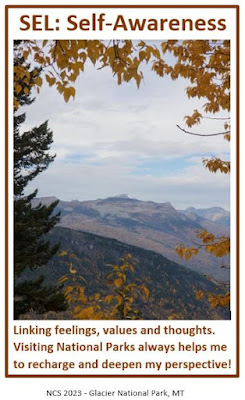Linking feelings, values, and thoughts is an important part of our self-awareness and well-being, regardless our age.
Learning to understand the connections early makes our lives easier. Unfortunately, many of us may have experienced more of negative thoughts and feelings. The good part is: it is never too late to start focusing on the positive experiences.
I am very fortunate because I get to travel to beautiful places like National Parks. But learning to look around to see something beautiful, something positive is a skill I have practiced for a long time. It is about choosing to see the positive (and this is very different from toxic positivity).
As educators we CAN help our students to have positive learning experiences. For Early Learning there is HOPE - Healthy Outcomes from Positive Experiences. Here is a 2-pager about HOPE.
We all can choose to decrease the impact of ACEs (Adverse Childhood Experiences) by purposefully focusing on the positive and supporting our students' social-emotional growth with classroom interactions - regardless of the age of our students! My students are adults, and we still enjoy the SEL discussions.
It is extremely important to invest in our relationships with our students, make sure they have a safe and equitable learning environment, and help every student to engage in their own learning process to link their feelings, values and thoughts to what they are learning.
Here is more information about using Trauma-Informed Practices in education!



